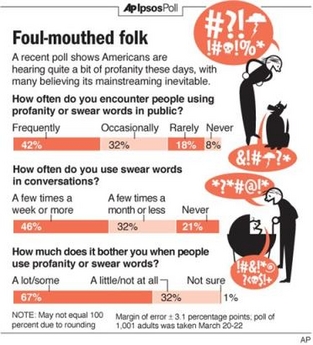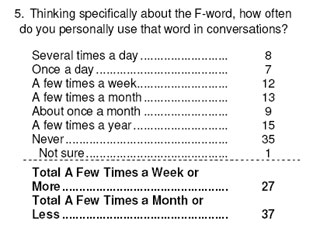April 02, 2006
"Thinking specifically about the F-word..."
To round out a week of posts on profanity (most recently Roger Shuy's droll April Fool's Day spoof), let's consider a new Associated Press poll on the subject conducted by the market research company Ipsos. As the AP reports, nearly three-quarters of Americans questioned said they encounter people using profanity in public frequently or occasionally, while two-thirds said they think people swear more than they did 20 years ago. These statistics are enough to provoke the AP to ask: "Are we living in an Age of Profanity?" To which the only possible response seems to be: "Who the fuck knows?"
 Apologies for actually using profanity in a discussion of profanity.
That wasn't an option for either the Ipsos pollsters or the AP
reporters, who were compelled to refer only to "profanity" and "swear
words" without getting very specific. The super-meta opening sentence of
the AP article highlights the necessary indirection: "This is a story about words we can't print in this story." In the graphic accompanying the article, jaunty cartoon figures are shown exchanging speech balloons full of avoidance
characters, mixing in skulls and lightning bolts among the usual
typological mishmash. The text of the article only alludes to one
profanity in particular, and it's given the favored metalinguistic
label of "the F-word" (characterized as "the
gold standard of foul words"). I thought that the distancing F-label
was pretty safe to use in the print media these days, but the article includes a
parenthetical note: "For the record, we needed special dispensation
from our bosses just to say 'F-word.'" (They run a tight ship over at
the AP.) Elsewhere in the story, one of the regular folks brought in
to bemoan the rampant spread of profanity opts to use the effing
avoidance strategy: Darla Ramirez, a 40-year-old
housewife from Arlington, Texas, says she hears "people talking about
their F-ing car, or their F-ing job. I'll hear it walking down the
street, or at the shopping mall, or at Wal-Mart."
Apologies for actually using profanity in a discussion of profanity.
That wasn't an option for either the Ipsos pollsters or the AP
reporters, who were compelled to refer only to "profanity" and "swear
words" without getting very specific. The super-meta opening sentence of
the AP article highlights the necessary indirection: "This is a story about words we can't print in this story." In the graphic accompanying the article, jaunty cartoon figures are shown exchanging speech balloons full of avoidance
characters, mixing in skulls and lightning bolts among the usual
typological mishmash. The text of the article only alludes to one
profanity in particular, and it's given the favored metalinguistic
label of "the F-word" (characterized as "the
gold standard of foul words"). I thought that the distancing F-label
was pretty safe to use in the print media these days, but the article includes a
parenthetical note: "For the record, we needed special dispensation
from our bosses just to say 'F-word.'" (They run a tight ship over at
the AP.) Elsewhere in the story, one of the regular folks brought in
to bemoan the rampant spread of profanity opts to use the effing
avoidance strategy: Darla Ramirez, a 40-year-old
housewife from Arlington, Texas, says she hears "people talking about
their F-ing car, or their F-ing job. I'll hear it walking down the
street, or at the shopping mall, or at Wal-Mart."
Unlike the BBC-sponsored survey ranking the perceived rudeness of 28 selected terms, the F-word is the only one that the Ipsos pollsters specifically asked about. (Accompanying the Ipsos press release is a PDF file with the topline results for the "Associated Press Profanity Study.") After four questions about how often respondents use and encounter "profanity or swear words," the study poses one of the great survey questions of all time: "Thinking specifically about the F-word, how often do you personally use that word in conversations?" Assuming the demographic questions were asked first, that would leave this as the final question of the survey. I'm guessing they positioned it last in case people with delicate sensibilities responded in shock, horror, or uncontrollable laughter.
A whopping 35 percent of those questioned claim that they never drop the F-bomb in
conversation. Another 37 percent say they use it a few times a month,
about once a month, or a few times a year. (Another 1 percent are "not
sure" of how often they say it.) But we didn't see reverse-spin
headlines like "Genteel Americans
eschew F-word: only 27 percent use 'gold standard' of profanity on a
regular basis." Instead the AP reported that "a healthy 64 percent said they use the F-word." This better fit the overall thrust of the article, focusing on the big majorities who say they hear public profanity "frequently" or "occasionally," and those who say people swear more often than they did two decades ago.
How useful are the Ipsos/AP statistics from a sociolinguistic standpoint? I'd say they're just about worthless. First of all, self-reported evaluations of speech patterns are notoriously unreliable, let alone evaluations of taboo items that the questioners themselves can't even refer to without avoidance strategies! Also, what counts as a "profanity" or "swear word"? Besides "the F-word," that's left up to the judgment of the individual respondents, since specific lexical items are of course deemed unmentionable. And finally, what does it mean that 67 percent of those questioned think that people swear more now than 20 years ago? I haven't seen any other public survey like this in the past, but I'd wager that just about every generation in modern American history has thought that profanity was on the rise. "Swear words" are particularly susceptible to the Recency and Frequency Illusions discussed in this space by Arnold Zwicky (e.g., here, here, and here). It's the same hell-in-a-handbasket degenerationism that informs perceptions of non-standard usage in general. In the case of profanity, the perceived increase in conversational usage may be shaped by a gradual easing of taboo restrictions in recent decades — at least in certain public contexts not bound by, say, the AP Style Guide or the whims of the FCC.
One context in which those usage taboos have been eased is in our hallowed dictionaries. But don't tell that to Irene Kramer, a grandmother in Scranton, Pa., who told the AP that she is bothered by what she overhears from the nearby high school:
"What we hear, it's gross," says Kramer, 67. "I tell them, 'I have a dictionary and a Roget's Thesaurus, and I don't see any of those words in there!' I don't understand why these parents allow it."
Kramer must not have bought a dictionary since the early 1970s, when major collegiate dictionaries like Merriam-Webster's and American Heritage began including "fuck" and various other taboo items. (And please don't expose her to HDAS or Cassell's!) Lexicographers have long taken the descriptive approach to "obscene" or "profane" vocabulary, recognizing that every age is, more or less, the Age of Profanity.
Posted by Benjamin Zimmer at April 2, 2006 01:17 AM